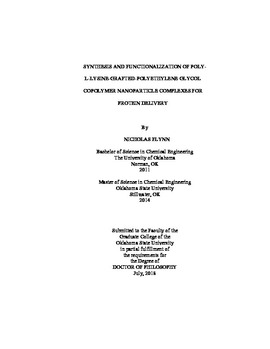| dc.contributor.advisor | Ramsey, Joshua D. | |
| dc.contributor.author | Flynn, Nicholas | |
| dc.date.accessioned | 2019-03-22T18:57:15Z | |
| dc.date.available | 2019-03-22T18:57:15Z | |
| dc.date.issued | 2018-07 | |
| dc.identifier.uri | https://hdl.handle.net/11244/317674 | |
| dc.description.abstract | Proteins are a large group of biomolecules that are capable of a broad range of biochemical functions. Utilizing the biochemical capabilities of proteins is of significant interest toward improving human health. For proteins to be useful, they must be appropriately delivered to perform the task for which they are needed. This work investigates how the cationic copolymer, poly-l-lysine-grafted-polyethylene glycol (PLL-g-PEG), may be used to modify proteins in order to improve aspects of their delivery. PLL-g-PEG was found to associate with a model protein, BSA, to form nanoparticle complexes through electrostatic interaction between the protein and copolymer. Molecular characteristics of the copolymer, such as PLL molecular weight and PEG grafting were found to impact both the ability of the copolymer to associate with the protein and also the stability of the resulting complexes. The nanoparticle complexes were functionalized with cell-penetrating peptides (CPPs) to impart the ability to enter into a broad range of cell types. The impact CPP functionalized nanoparticle complexes had on albumin in the physiological environment was investigated. CPPs were found to induce conformational changes in albumin, with the extent of albumin denaturation correlating with CPP charge and arginine content. The denaturation of albumin played a role in uptake of the nanoparticle complexes by macrophages. Cell specific delivery of PLL-g-PEG nanoparticle complexes was demonstrated by functionalizing PLL-g-PEG with an anti-PSMA monoclonal antibody. The anti-PSMA-PLL-g-PEG nanoparticle complexes were able to deliver a cytotoxic protein, glucose oxidase, to prostate specific membrane antigen (PSMA)-expressing LNCaP cells, while inducing negligible cytotoxicity in PC-3 cells, which lack PSMA. Together, these studies demonstrate the wide utility of PLL-g-PEG to provide a base for altering the characteristics of proteins which may be used to improve their delivery. | |
| dc.format | application/pdf | |
| dc.language | en_US | |
| dc.rights | Copyright is held by the author who has granted the Oklahoma State University Library the non-exclusive right to share this material in its institutional repository. Contact Digital Library Services at lib-dls@okstate.edu or 405-744-9161 for the permission policy on the use, reproduction or distribution of this material. | |
| dc.title | Synthesis and functionalization of poly-l-lysine-grafted-polyethylene glycol copolymer nanoparticle complexes for protein delivery | |
| dc.contributor.committeeMember | Gappa-Fahlenkamp, Heather | |
| dc.contributor.committeeMember | Ford Versypt, Ashlee N. | |
| dc.contributor.committeeMember | Hartson, Steve | |
| osu.filename | Flynn_okstate_0664D_15916.pdf | |
| osu.accesstype | Open Access | |
| dc.type.genre | Dissertation | |
| dc.type.material | Text | |
| thesis.degree.discipline | Chemical Engineering | |
| thesis.degree.grantor | Oklahoma State University | |
